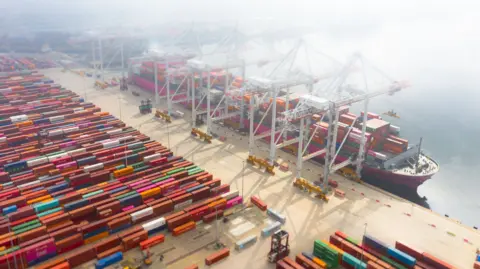The writer is deputy secretary of the US Treasury
Vladimir Putin’s appointment of an economist to head Russia’s defence ministry is about one thing: focusing the country’s economy on the production of military equipment. This is a direct result of the US and our partners’ deliberate efforts to use our sanctions and export controls to target Russia’s military industrial complex. Our collective effort is aimed at constraining the Kremlin’s ability to build the weapons it needs for the war in Ukraine.
Amid unprecedented multilateral sanctions and a global private sector exodus, Putin faced a choice: preserve the future health of the country’s economy or continue to prosecute his illegal invasion. It’s clear he has chosen the latter, turning Russia into a full-fledged war economy. At the cost of spending on its people, Moscow has doubled defence spending from 14 per cent of the budget in 2021 to 29 per cent this year. The Kremlin has nationalised industries across the economy — from an auto trader to a chemicals company to a metals producer. And businesses are reorientating from serving the public to serving the military, such as a former bakery that is now building drones.
I was in Kyiv and Germany this week to discuss with my counterparts what we can do to continue to put sand in the gears of Russia’s war machine. First and foremost, we must recognise that this machine is powered by and reliant on imported components critical to the manufacture of ammunition, missiles and tanks. Before, certain sectors of the Russian economy imported dual-use goods to carry out normal economic activity. But now Russia’s entire industrial base is on a war footing, we need to ensure that sensitive dual-use goods — from machine tools to microelectronics — are not getting into the country. We need the private sector to help us accomplish this goal.
It is important to recognise that the success of our sanctions and export controls is only possible because of a partnership with the private sector. Companies have already done a great deal to help us constrain the Kremlin’s access to goods, but we need them to do more. It is critical that our manufacturers take every step within their power to scrutinise their supply chains and prevent western-made equipment ending up in the weapons being deployed by the Kremlin.
We also need financial institutions in our countries to examine their correspondent relationships in the nations that are providing the Russian military industrial base with material support. This includes paying special attention to the small and mid-sized banks that are often the Kremlin’s preferred vehicles to process payments for military goods.
We recognise that doing this work is not easy and it takes time. It also can come at the cost of short-term profits, especially for those businesses that had long-existing relationships with Russia. But we should be clear-eyed that a Russian military backed by a mobilised economy will only grow in ambition. The cost to our companies and to the American and global economies of an emboldened Russia will dwarf the cost of taking action now. We need only look back to the increase in global headline inflation caused by the onset of Russia’s full-scale invasion of Ukraine in 2022 and the lingering effects felt around the world today.
When I talk to the leaders of businesses across our coalition, they understand the stakes and are willing to do their part. They have rightly asked us for two things to help them help us. The first is more information. It is critical that our coalition continue to provide detailed, actionable information and typologies to our companies that are working hard to do the right thing. The second request has been for a risk-based regulatory and supervisory regime that allows them to better focus resources on our main concerns. We are prioritising delivering these reforms to our anti-money laundering regime in the US. But we also know that other countries need to take steps such as improving their customs and export control regimes.
The top strategic questions for Russia today revolve around military central planning, procurement and production. It’s why Putin gave his new defence minister the mandate “to open the defence ministry to innovation”. To be clear, the innovation he seeks is newfound efficiency in destroying Ukraine’s communities, infrastructure and people. Together we can and must do all we can to stop Russia’s war machine.























































